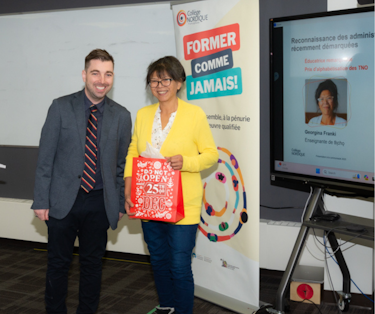Child Development Monitoring from 0 to 5 Years (In French)
This workshop offers you an understanding of the motor, cognitive, language, socio-emotional, and sensory development stages of children aged 0 to 5.
Free
Truth and Reconciliation in Canada is the on-going process of addressing the abuse and injustices endured by Indigenous Peoples, most notably those linked to the Indian Residential School system which operated from the beginning of the 19th century to the end of the 20th century. Truth and Reconciliation aim to encourage collaboration between Indigenous People and the Canadian government to establish and maintain a shared way of life based on respect, to foster strong, healthy and sustainable Indigenous Nations in a unified Canada.
This process was formalised by the creation of the Truth and Reconciliation Commission (TRC) of Canada, which was in effect from 2008 to 2015. The TRC’s mandate was to document the abuse, to officially acknowledge the suffering of the Survivors and Indigenous communities, and to create concrete Calls to Action to support reconciliation between Indigenous Peoples and Canadians. At the end of this process, the TRC had created a collection of witness testimonies from Survivors of the residential school system and published a multi-volume final report of its work and findings and issued national Calls to Action. Included among these Calls of Action were the promotion of a fair and equitable justice system and better access to health services for Indigenous Peoples, the integration of Indigenous Peoples history and the legacy of residential schools into the Canadian educational system, and the protection and promotion of Indigenous languages and culture.
Each year, on September 30th, Canadians observe the National Day for Truth and Reconciliation and Orange Shirt Day. This public commemoration honours the tragic and painful history of residential schools and the ongoing impacts on the Survivors, their families and their communities.
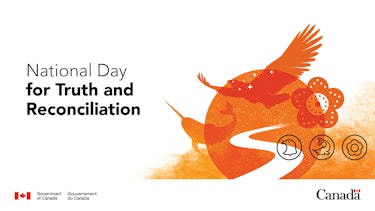
It is in this context that Collège Nordique is committed to working for truth and reconciliation.
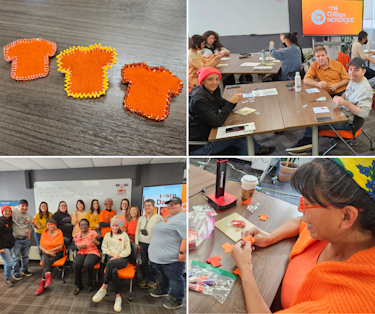
With the decline of Indigenous languages spoken in Canada (Statistics Canada, 2021), the decolonization and indigenization of language teaching practices are essential to the preservation of Indigenous cultures, languages and worldviews. That's why Collège Nordique is committed to working with local organizations, Indigenous groups, as well as the territorial and federal governments, to make learning Indigenous languages and cultures accessible, engaging and relevant to community members.
A first step: contributing to the revitalization of Indigenous languages
Collège Nordique is located in Yellowknife, in the heart of the Northwest Territories, where nine official Indigenous languages are spoken: Dene kǝdǝ́, Dëne sųłıné, Dene zhatıé, nēhiyawēwin, Dinjii zhuʼ ginjik, Inuinnaqtun, Inuktitut, Inuvialuktun, and Tłı̨chǫ.
In its efforts to help revitalize Indigenous languages, Collège Nordique has been offering courses in Tłı̨chǫ Yatıı̀ since 2016, taught by three outstanding professors: Georgina Franki and Camilia Zoe Chocolate, Tłı̨chǫ instructors from Behchokǫ̀, and Rosie Benning, a French and Tłı̨chǫ instructor and manager of the language school.
However, it was essential for the College to work more closely with Indigenous communities, as our “never about them without them” guideline is at the heart of our commitment. Thus, on April 3, 2023, we were pleased to conclude an agreement with the Tłı̨chǫ Government for the teaching of the Tłı̨chǫ language within the communities. By carrying out this initiative, the Tłı̨chǫ Government has enabled more people to access Indigenous language classes, train an instructor, and continue efforts to revitalize Indigenous languages.
Today, we can say that our collaborations with the Tłı̨chǫ Government, the Yellowknives Dene First Nation, and other community organizations, such as the Wek'èezhìi Land and Water Board (WLWB) and Bushkids, have borne fruit. The number of Indigenous languages students has grown from 16, in our first year, to 262 for the 2022-2023 academic year.
Rosie Benning is more than delighted with this enthusiasm:
"When I see how far we've come since the early days of the Collège to today, I am so happy and proud to see how Tłı̨chǫ courses benefit the communities!"
Patrick Arsenault, Executive Director of Collège Nordique, is often asked about the importance the Collège, a French-language post-secondary institution, places on collaboration with Indigenous communities:
"I think it's important for Collège Nordique to act for truth and reconciliation by leveraging its experience and strengths. As a cultural and linguistic minority, Francophones want to better understand the realities of Indigenous peoples through learning their languages and sharing cultures. Collège Nordique is proud to build bridges between Francophones, Indigenous Peoples, newcomers, and other community members."
Jody Ann Zoe, a Tłı̨chǫ student from Behchokǫ̀ in the Northwest Territories, explains that she enrolled in this course to be able to hold a conversation with an elder :
“I noticed that, in my community, not a lot of young people can speak the language, so I want to revitalize my language starting with myself.”
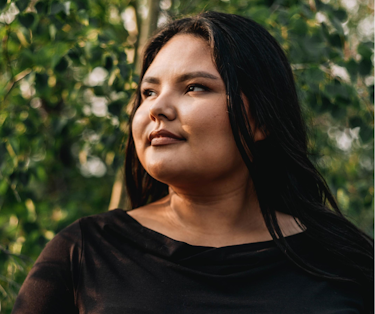
For the Dene Tłı̨chǫ author Richard Van Camp, who took the course virtually, his learning has profoundly transformed his family:
My mom was recently in town, and I was able to call her semǫ (my mom). We’d never done this before. At 51, my mom is helping me learn my 1 through 10s, and she is 71. I am living proof that it’s never too late to learn your language and take responsibility for your culture. For our child, Edzazii, to see and hear us practicing Tłı̨chǫ makes me so happy.
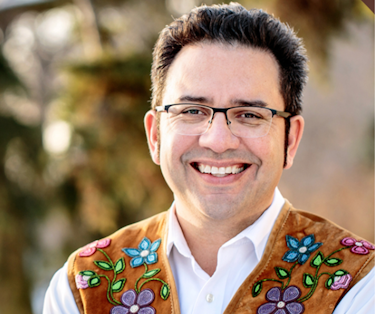
The motivation of the students and the success of the courses give us great hope for the revitalization of Indigenous languages and encourage us to intensify our efforts to pursue our mission with even greater determination. With this in mind, we launched Inuktitut courses in 2024.
As learning is at its best when it engages all our senses, our Indigenous languages courses are carefully designed for immersion in the culture, enriched by a variety of activities. In addition to their classes, learners take part in indoor and outdoor activities with Dene Elders who share their knowledge of the language and way of life.
A second step : contributing to reconciliation through sharing and immersion
Since 2019, we have implemented an intergenerational and intercultural twinning program between Tłı̨chǫ students and Dene Elders and Knowledge Keepers. This program has grown steadily and is attracting increasing interest from the students. For the spring 2024 session, we had over 14 registrations and the active participation of ten Elders and Knowledge Keepers.
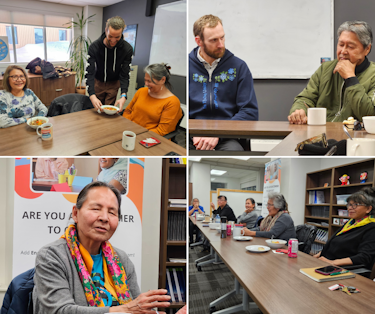
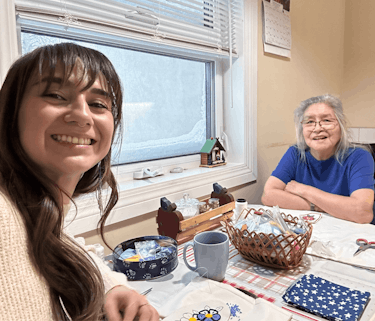
This year, introductory Tłı̨chǫ classes on the land are taking place at the Įtłʼǫ̀ School Outdoor Learning Centre and at the Bushkids site, where an Indigenous teaching approach provides participants with more authentic learning. Nature then becomes both a place of learning and a source of teaching, enabling learners to develop their cultural understanding while learning the language.
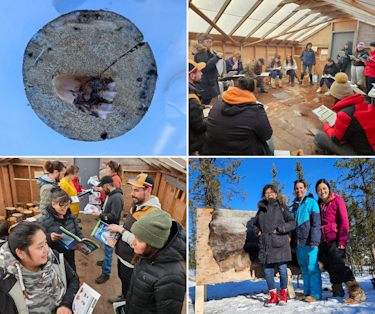
During on the land activities, such as caribou hide tanning camps, students have the opportunity to witness first-hand the deep connection that Dene Elders maintain with the land. By practicing the language and listening to traditional stories, they immerse themselves in the vision of their world, and enrich their cultural understanding.
In 2023, we launched a partnership with YK1 to host a week-long tanning camp, combining language workshops for 6th-grade students with a public exploration of traditional caribou, elk and muskox hide preparation techniques. This collaborative initiative illustrates our dedication to revitalizing Indigenous culture through innovative educational projects.
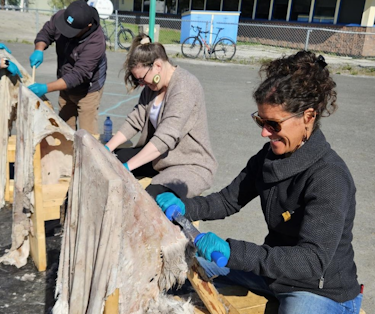
Tłı̨chǫ language courses are just one example of how Collège Nordique is actively working towards decolonize and indigenize language teaching practices in the North. Students learning English and French as a second language, also have the opportunity to learn more about the lifestyle of Dene Elders, through organized activities such as ice fishing, fish scale art and workshops on local medicinal plants.
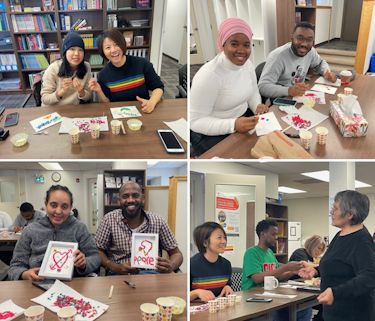
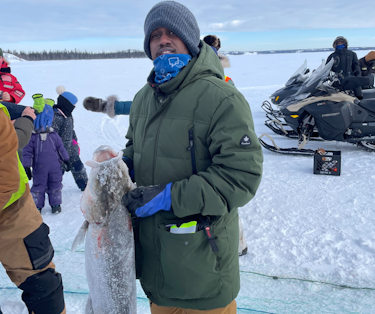
Other indoor activities include an introduction to the art of beading, moccasin sewing and learning through board games.
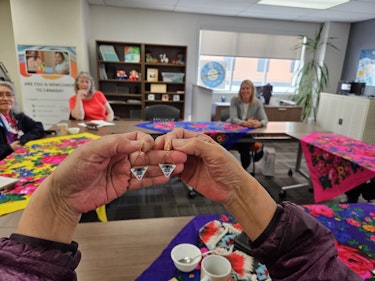
Additionally, Collège Nordique offers immersive Tłı̨chǫ language courses in partnership with the Yellowknife Public Library. These 10-week sessions are open to all and include fun activities such as board games and beading sessions, offering participants an enriching introduction to the Tłı̨chǫ language and culture, in a enjoyable setting.
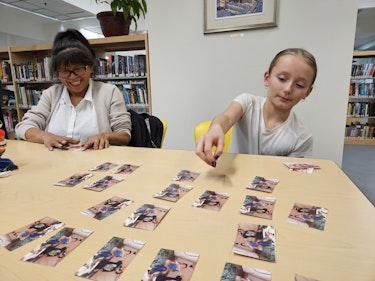
These initiatives enrich our already culturally rich language program with local resources such as the Tłı̨chǫ language workbook Tłı̨chǫ Yatı̀ eyıts'ǫ Dǫ Nàowoò (Benning & Franki, 2022), the French workbook Rendez-vous Nordiques : langue et culture (Garcia, 2021), and the English workbook Meet Me Up North (Galarneau & Gonzalez, 2023). They reflect our ongoing commitment to Decolonizing and Indigenizing teaching practices in the North, while contributing to sustainable reconciliation within our Canadian communities.
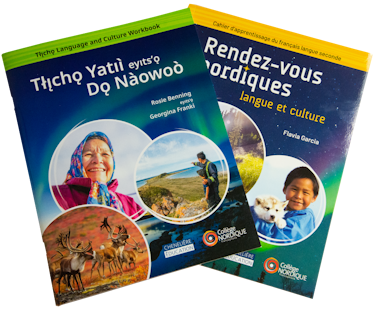
For many, reconciliation is a responsibility that must be shared by all Canadians in order to learn to live together in harmony.
Longtime Yellowknifer Kim Nichols says:
“I experienced this as a non-Indigenous person who is employed by the territorial government. This type of programming is integral to building relationships within communities and gaining a better understanding of our context as settlers. Learning the language and culture helps us understand the local values and needs, as well as the barriers present when addressing these needs. I believe learning the language is a vital step in reconciliation with our past not just for Indigenous Peoples, but as responsible Canadians.”
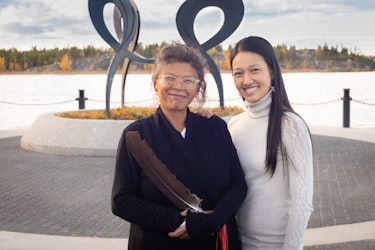
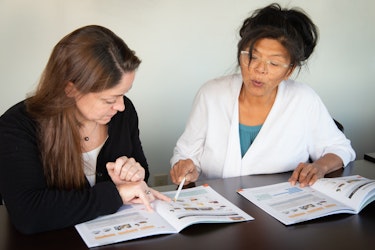
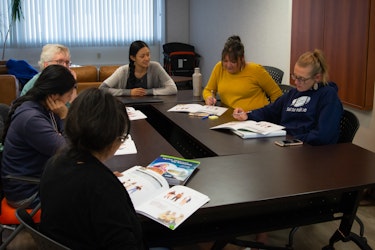
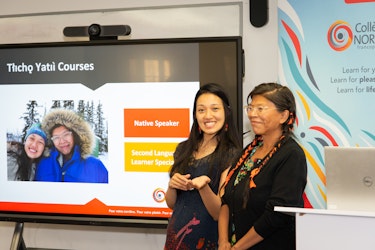
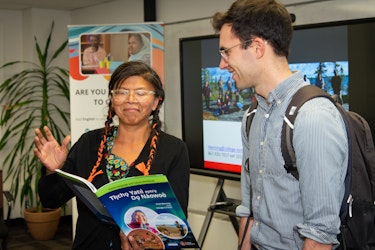
Georgina Franki, as a Knowledge Keeper in the context of Tłı̨chǫ language courses, emphasizes the importance of Indigenous and non-Indigenous community members working together so that her grandchildren can grow up in a world where they can realize their dreams, free from the intergenerational traumas caused by colonialism. To achieve this, she says, we must listen to each other and learn from one another in order to understand. It's essential to acquire a mutual knowledge of each other's language and culture.
Georgina often quotes her Elders who say:
“Be strong like two people!”
In recognition of her hard work, determination and commitment to teaching the Tłı̨chǫ language, Georgina received the NWT Literacy Award in 2022.
